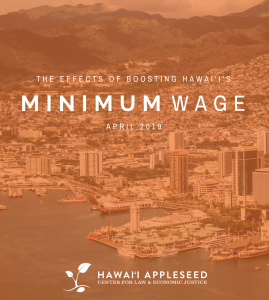REPORT: The Effects of Boosting Hawai‘i’s Minimum Wage
A new report from the Hawai‘i Appleseed Center for Law and Economic Justice, found that if the minimum wage in Hawai‘i were to rise to $17 by 2024, the increase would give over 200,000 Hawai‘i workers and their families a raise. This would especially help women and parents in low-income and working-class households, helping to keep them and their families out of poverty and homelessness.
Hawai‘i has the highest cost of living of all the states, and when that is factored in, Hawai‘i has the lowest average wage in the nation. Meanwhile our minimum wage is $10.10 an hour—or just $21,000 a year for full-time work. Currently 10 states and the District of Columbia have minimum wages higher than in Hawai‘i. California, New York, Massachusetts, the District of Columbia, New Jersey, Illinois and Maryland have already passed laws to increase their minimum wage to $15 per hour, while their costs of living are all lower than in Hawai‘i.
If Hawai‘i were to raise the minimum wage to $17 by 2024, an estimated 208,000 workers would be directly affected by the five years of increases in the minimum wage. In addition, 61,000 workers who earn slightly above the minimum wage would also get raises, or be indirectly affected. This increase would improve the pay of a wide range of workers:
- The majority of affected workers would be women (55.7%). Close to half of women working in Hawai‘i would be affected (47.8%).
- 46.4% of Native Hawaiian workers, and 64.3% of Pacific Islander workers, would be affected by the minimum wage increase.
- Over a quarter (28.7%) of affected workers would be parents. Over half (52.9%) of single parents would be affected.
- Only 4.5% of directly or indirectly affected workers would be teenagers. Over three in four (78.3%) of affected workers would be age 25 or older.
- Over half (51.1%) of affected workers have at least some college education.
- Nearly two-thirds (65.8%) of retail workers, and over four in five (80.6%) of restaurant and food service workers would be affected.
“Raising the minimum wage would boost not just the pay of many struggling Hawai‘i workers and their families, but it would also boost local businesses,” said Nicole Woo, senior policy analyst at Hawai‘i Appleseed. “That’s because low-wage workers plow almost every additional dollar of earnings back into the local economy. In fact, if the wage rose to $17 by 2024, Hawai‘i’s minimum and near-minimum wage workers would receive a total pay increase of over $1.3 billion to spend in their communities.”
In addition, decades of research—as well as real-world evidence—have proven that raising the minimum wage does not cause businesses to shed jobs. Between 2015 and 2018, when the minimum wage in Hawai‘i rose by 39%, the state’s unemployment rate dropped by 52%. And since the minimum wage started rising in 2015, there has been a 22% increase in restaurant server jobs.
















